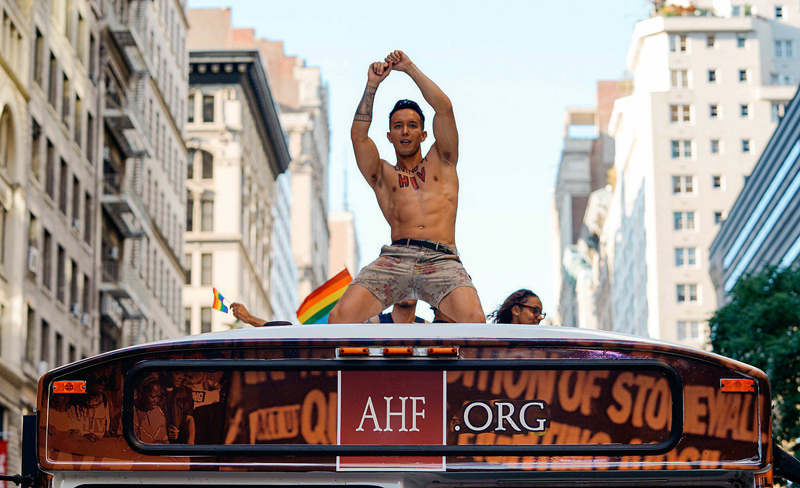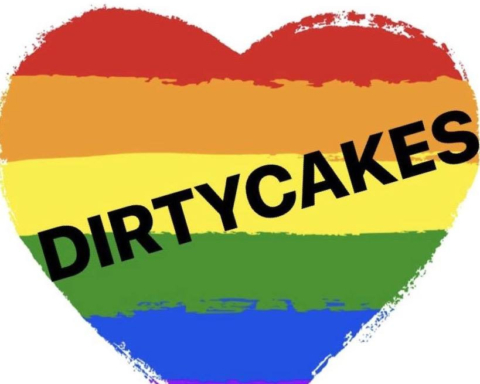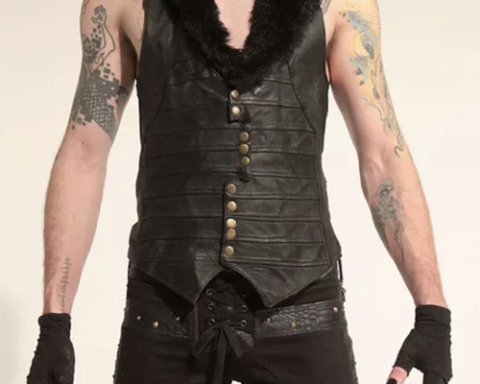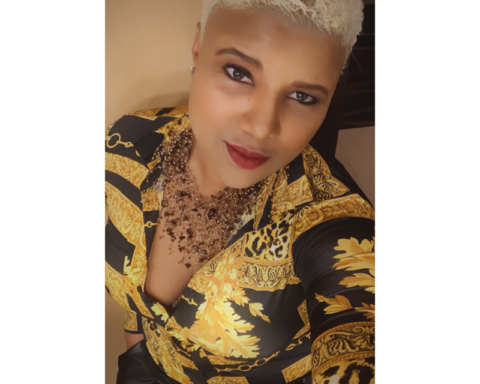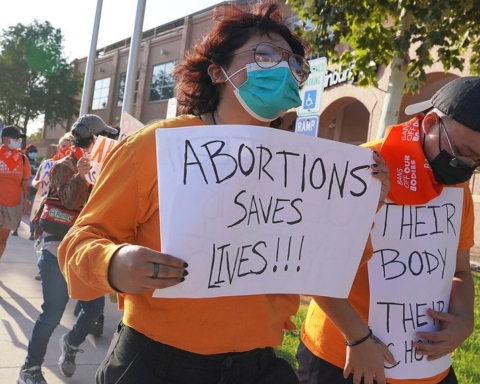Raif Derrazi has created a lane of his own by truly embracing his identity and taking on every obstacle in his path head first, inspiring and motivating so many people along the way. As an award-winning body-builder, he never misses an opportunity to take his shirt off but there is so much more to his story than his impeccable physique, he is HIV+ and has become an advocate for educating the public about HIV/AIDS awareness and information. He speaks about breaking stigmas and living his best life by fully exposing his personal experiences to share with the world.
I was thrilled for the opportunity to have Raif share his experiences living with HIV and his activism in the gay community with The LGBT Sentinel in a one-on-one personal interview that we recorded while he was in his hotel room in NYC this past weekend for 2019 World Pride.
Tell us a little bit about yourself?
Derrazi:I’m 34 years old and I was diagnosed with AIDS when I was 27 back in 2012. I have been on a path of health and fitness since then and that’s kind of what was really the catalyst for me, a life-changing moment for me. The past seven years since my diagnosis, I’ve just been turning around not only my physical health but also my perception of self and my self worth and how I value myself. That’s my passion now, HIV advocacy and helping people realize that it doesn’t have to define you. It’s a manageable condition.
when did you first realize you were gay?
Derrazi:When I look back, it’s different from when it was in the moment. I didn’t realize until I was gay until I fell in love with my best friend, probably my junior year of high school. Looking back, there were so many times in my childhood where I had thoughts about boys or like pictures that I would get a rise out of, like, the Marlboro Man. I thought he was attractive, but I think I just really suppressed it so much, especially growing up since I was bullied, called faggot a lot and every other derogatory name, that I just didn’t allow myself to even consider that I could be gay. So, in truth, it was very early on that consciously wasn’t until high school.
Right now I am in New York during World Pride and I’ve actually only been here once when I was 19. This is my first real experience of the true New York and I have to say is freaking amazing. There are special events going on all the time right now, like Sunday Pride March, which is at least six or seven hours long. It’s insanely huge. For example, yesterday we had the Stonewall rally. So I did that. It was right outside Stonewall and there were so many performers and celebrities that showed up. I got to go with a backstage pass to interview a bunch of them on the red carpet while I was there.
What are your bad days like and how do you handle them? Can you describe that scenario and the process that you go through?
Derrazi: Okay, first of all, I want to say that my bad days are far and few in between than they were in the past, I’ve done a lot of internal work to change the way that I think and the way that I handle bad days. So, nowadays, I would say 95% of the time I tend to go from way high to really low. When I have a bad day, all the things that I’m usually really confident and proud in kind of falls in reverse and I doubt everything and I question everything. I’m like, I don’t even know what I’mdoing, who am I? How dare I? What do I know?
I have implemented a lot of strategies and habits to counter that, particularly in gratitude. So I have a gratitude journal that I immediately go to and I’ll start I’ll force myself to be grateful with positive affirmations. But yeah, for sure there are days when I feel sluggish and down and I don’t have energy and I just feel like the scum of the earth. Who doesn’t? For me, it’s about trying to create tactics that will help me minimize that instead of falling into depression.
How did you find out that you were HIV positive?
Derrazi: Well, I was in a, at a time three and a half years, monogamous (or so I thought) committed relationship. I didn’t have health insurance and I was getting really, really sick, more and more symptoms kept piling on and I thought that’s so bizarre and so strange. I was like, what’s wrong with my health and I can’t get to a doctor because I don’t have health insurance. It got to the point where I had a sore in the back of my throat that would not heal for months and was painful. Okay, fine, I guess I just have to see someone also all going to county hospital and I’ll just and I waited there had to wait eight hours to see a doctor.
They were like, okay, we’re just going to run the whole all the tests, just to be sure. And it came back to my follow up.
She said, “You have HIV.”
That moment the worst fear of my life suddenly became true.
I thought, I am going to die in two or three years and I just started bawling.
And she’s like, I’m gonna, I’m gonna step out of the room and I’m gonna give you 10 minutes, call someone and talk to someone, and then do your thing. And I’ll come back and then we can, we can go from there. She came back and she said, “okay, I need you to come back next week, and you’re going to go to the HIV clinic. Don’t be scared because there’s going to be a lot of people who are sick and who will look bad, but that’s because there’s a lot of people who are drug addicts and homeless with HIV.”
Then my doctor came in saying, “Happy Birthday!”
Oh, no, it was your birthday?
Derrazi: Yes, It was my birthday. So then I was crying, she was crying.
I’m So Sorry.
According to Reuters, 2 people have been reported to be cured as of April 2019. With today’s advanced medicine and modern technology, do you see more solutions possible in our foreseeable future for HIV/AIDS?
Derrazi: A lot of talk in the community is that there really is no reason for there to be an epidemic, or transmission of the virus anymore which has come out recently. Actually came out, I think the year that I was diagnosed, so I just missed that though. Also, now with U=U, which is “Undetectable equals Untransmittable” which is a campaign that’s been started that basically states that if you are under you have an undetectable viral load things are easier. Meaning that if the medicine is working and doing its job and suppressing the virus, so that tests can no longer detect the virus in your blood. You are no longer able to transmit the virus to another human being. What that means is if people are on treatment, if they have access to care, if they are taking it consistently, there’s no reason why HIV should be spreading. It should die off at this point.
The problem is that it isn’t the case, there still transmission, there’s still issues, accessibility issues, education issues. There’s a stigma. That’s what’s keeping the virus constantly out there in the community and infecting more and more people and that’s what we have to address. Until there’s a cure, we have to address stigma, because then people make up their choices. They’re too afraid to go to the doctor, or they are so depressed that they don’t want to take their medication, they don’t feel that they deserve to live. There are just so many variables that we have to tackle, but practically we can end HIV now.
People just don’t want to be associated with it.
So what are your plans for yourself? for the future? What advice would you have to any to anyone on any level to share their honesty and truth in the selfless ways that I’ve seen you share?
Derrazi: It may be easier to lie in the short term, but it’s a lot harder to lie in the long term. It’s like micro versus macro, it is easier in the micro but in the macro, you’re going to suffer. So I just always come from a place growing up to that openness and honesty and transparency. I value it so much, and it’s just proven itself over time to bring back returns that are unmeasurable. When you hide or are secretive about something that you feel negatively about, that’s like a little insidious bump inside your body, no pun intended to HIV, but it’s something that’s eating away inside you and it’s going to blow and it’s going to affect you negatively over time. I know that everyone has their own unique situation and circumstances, I can never judge anyone for what they decide to do. Everyone has to do what’s right for them. It’s a very private thing to talk about HIV.
I encourage people if they are in a situation where it’s not going to be dangerous to their health or to their livelihood to be as authentic as possible. Yes, it’s scary, and yes, you’re sometimes going to lose friends, your family members. At the end of the day, if you can sleep peacefully at night, you don’t need those people to begin with. I lost my whole biological father’s side of the family because I decided to start talking about HIV publicly, and I would never go back and change my mind about that. I lost plenty of friends when I came out and decided that I was going to accept being gay, but I’m better off for it. Open your book up to anyone who is ready to learn and listen.
I don’t want to take up too much of your time, especially while you’re in New York, tell us how can we get more information or what organizations that you are part of.
Derrazi: So, aside from my YouTube, you can look up my name on Instagram which is the same thing as my name on Facebook, my name is Raif Derrazi, I try to make that easy across all platforms. I’m also in partnership with the AIDS Healthcare Foundation, they are a global HIV services organization. They’re in dozens of countries providing free HIV testing and services to millions of people every year. Yeah, so I’m just creating content with them so that we can both help our brands and continue awareness about HIV. I’m also working a lot with Carl Schmid, he’s an incredible advocate
for HIV.
Plus, life at the moment is just a work in progress.
Excited to be here in New York, celebrating this amazing history, the energy here is so incredible and visceral and the people here are so honest and real and gritty. It’s so amazing to be here, I’m having a blast.
Listen HERE for the full in-depth interview with Raif.
We want to thank Raif so much for taking the time out of his day while representing at World Pride and closing up our incredible 2019 Pride Month. I’m really happy that he was able to join us and share those moments.
Keep up with Raif Derrazi and his journey through activism and education by following him on his platforms and don’t forget to check back in with The LGBT Sentinel and follow us on our platforms.
@RaifDerrazi
@AmeliaDoll
@TheLGBTSentinel
@aidshealthcare
@KarlSchmid
#HIV #UEqualsU #AIDS #HIVpositive #TheLGBTSentinel
Listen to the full live interview with Raif HERE.
The Download and Listen the interview below
http://www.mediafire.com/file/zxfzz0zkc4lrjbg/WILLFULSINNER.mp3/file

